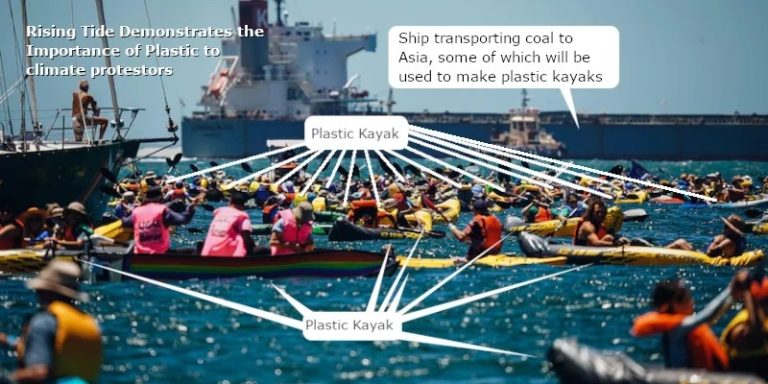Article by Eric Worrell
Last week, the rising tide provided an impressive display of plastic fossil fuel products amid climate protests.
Rising tide: climate change protesters arrested over coal exports at Newcastle port
Author: Romy Stephens and Bridget Murphy
in short:
Activist group Rising Tide said several people had been arrested at an anti-fossil fuel demonstration in Newcastle.
Thousands of people attended the multi-day protests, which featured speeches and performances by Midnight Oil frontman Peter Garrett.
What to do next?
Demonstrations are expected to continue into Sunday night.
Several arrests have been made at a climate protest in Newcastle that saw hundreds of activists descend on the city's harbor in canoes and kayaks.
The demonstration, organized by activist group Rising Tide, was billed as a “blockade” of the world's largest coal port.
A Rising Tide statement said multiple arrests were made on Saturday afternoon and most were released without charges.
…
Find out more: https://www.abc.net.au/news/2024-11-23/police-arrests-climate-change-protest-rising-tide-newcastle/104620058
If you look carefully at the picture above, you would be hard-pressed to find anything that is not made of plastic, except for the coal-carrying ships. Their life jackets are plastic, their oars are made of plastic, their kayaks are made of plastic, their T-shirts are mostly plastic, and if we could see them, we would likely discover whatever they were wearing on their feet is likely made of plastic.
If all the petroleum products that protesters carry and use suddenly disappeared, they would all find themselves swimming naked in the water.

China uses large amounts of coal in plastic synthesis. Mainland China has abundant coal resources but little oil and natural gas. Therefore, the petrochemical industry is increasingly leaning towards coal-based plastic synthetic hydrocarbons.
Black coal turns into white trash
February 13, 2020 By Richard Liu
Coal has long been China's “black gold”, providing more than half of the country's electricity. However, as coal's share of energy continues to decline due to domestic efforts to reduce air pollution and greenhouse gas emissions, a new coal industry is emerging. In China's arid northwest, eight factories are crushing lumps of coal and “cooking” the pulverized coal into something more valuable than electricity or even gold. There will soon be more than 20 coal conversion plants producing chemicals to make plastics.
In China's 13th Five-Year Plan for energy development, central policymakers set the goal of reducing the proportion of coal in China's energy mix. Reducing coal-fired power generation puts China on track to meet its 2030 emissions peak commitment under the 2015 Paris Agreement. At the 2019 United Nations Climate Summit, Chinese State Councilor Wang Yi did not make new commitments to reduce coal, and the risk of China deepening its reliance on coal has intensified.
…
China’s love affair with CTOs
While most plastics are produced from natural gas or crude oil, Chinese factories are converting coal into chemicals for use through direct coal-to-olefins (CTO) or multi-step coal-to-methanol (from coal), which then converts the methanol into chemicals. Chemicals used in the production of plastics. China is the only country that implements CTO on a large scale. From 2011 to 2015, China's coal-to-liquid production capacity increased from 1 million tons per year (MTA) to 7.2 tons, equivalent to 20% of China's plastic raw material production capacity.
Although methanol-to-olefins has become unviable in recent years due to uncompetitive methanol prices, the profitability of coal-to-liquids still attracts investment. Tian Yajun, a coal conversion expert at the China Clean and Low Carbon Energy Research Institute, said, “Coal-to-liquids players have profited from high oil prices. In recent years, CTOs have received the best returns among all coal conversion industries because demand is high and the central government The government does not control olefin or plastic prices.
…
Learn more: https://www.newsecuritybeat.org/2020/02/black-coal-white-trash/
Today, most kayaks are made from polyethylene resin—a direct product of China’s evolving coal-based plastic chemistry.
I find it hard to see this ridiculous plastic-tide “climate protest” as a legitimate protest. I see it more as an unconscious cry for help from young people who have been failed by their teachers and the Australian education system. If they had the faintest understanding of science or the products of the machine age they take for granted, they wouldn't be out there making a fool of themselves.
What happens to the coal exported from Newcastle? You wear it, sit on it, and rise to the occasion.
Relevant
